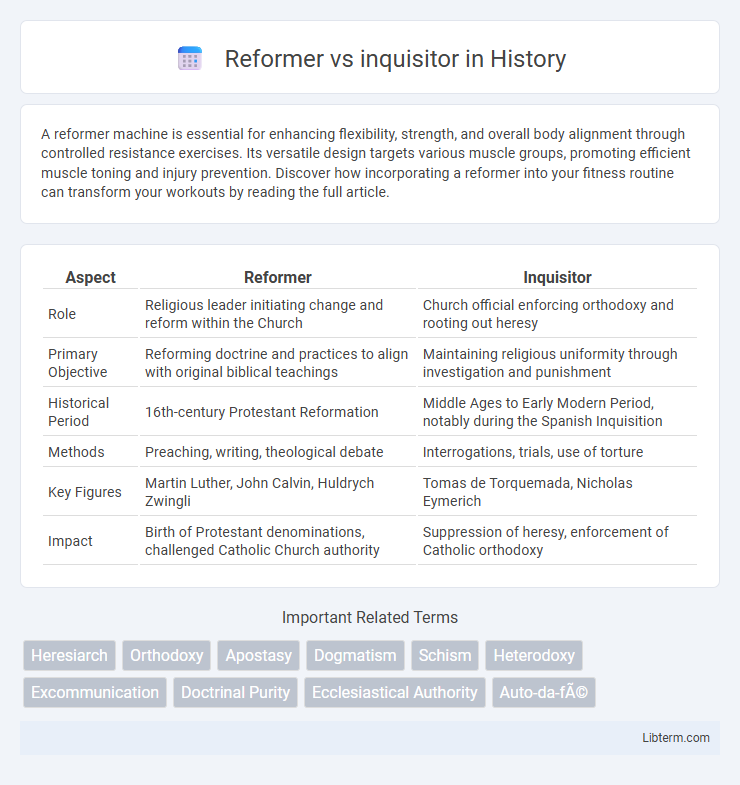A reformer machine is essential for enhancing flexibility, strength, and overall body alignment through controlled resistance exercises. Its versatile design targets various muscle groups, promoting efficient muscle toning and injury prevention. Discover how incorporating a reformer into your fitness routine can transform your workouts by reading the full article.
Table of Comparison
| Aspect | Reformer | Inquisitor |
|---|---|---|
| Role | Religious leader initiating change and reform within the Church | Church official enforcing orthodoxy and rooting out heresy |
| Primary Objective | Reforming doctrine and practices to align with original biblical teachings | Maintaining religious uniformity through investigation and punishment |
| Historical Period | 16th-century Protestant Reformation | Middle Ages to Early Modern Period, notably during the Spanish Inquisition |
| Methods | Preaching, writing, theological debate | Interrogations, trials, use of torture |
| Key Figures | Martin Luther, John Calvin, Huldrych Zwingli | Tomas de Torquemada, Nicholas Eymerich |
| Impact | Birth of Protestant denominations, challenged Catholic Church authority | Suppression of heresy, enforcement of Catholic orthodoxy |
Understanding the Reformer and the Inquisitor
The Reformer embodies a principled mindset driven by integrity, idealism, and a strong sense of right and wrong, always striving for improvement and ethical behavior. The Inquisitor, on the other hand, possesses a critical and investigative nature, seeking to uncover truths through questioning and deep analysis while challenging assumptions. Both types emphasize precision and clarity but differ in approach: Reformers aim to align actions with moral values, whereas Inquisitors focus on dissecting information to reveal hidden meanings and inconsistencies.
Historical Context: Origins and Evolution
The Reformer and Inquisitor roles emerged during the tumultuous period of the European Renaissance and Reformation in the 15th and 16th centuries, reflecting divergent responses to religious and political challenges. The Reformer, epitomized by figures such as Martin Luther and John Calvin, advocated for theological renewal and challenged established Church doctrines, leading to the Protestant Reformation. In contrast, the Inquisitor operated within the Catholic Church's judicial system, enforcing orthodoxy through the Inquisition institutions, particularly during the Spanish Inquisition, aiming to suppress heresy and maintain ecclesiastical authority.
Core Philosophies Compared
Reformers prioritize systemic change and innovation, emphasizing progress through restructuring institutions and societal norms. Inquisitors, by contrast, uphold rigid orthodoxy, enforcing strict adherence to established doctrines and punishing deviations to preserve tradition. This core philosophical divide centers on adaptability versus preservation, with Reformers advocating evolution and Inquisitors championing stability.
Methods and Approaches
Reformers utilize collaborative and evidence-based methods, emphasizing transparency, empathy, and systemic change to address issues. Inquisitors adopt authoritative and interrogative approaches, focusing on extracting confessions or information through rigorous questioning and pressure. While reformers prioritize constructive dialogue to foster improvement, inquisitors emphasize control and verification to enforce rules or uncover hidden truths.
Strengths of the Reformer
The Reformer excels in integrity, discipline, and a strong sense of justice, driving them to pursue ethical perfection and continuous self-improvement. Their analytical mindset and meticulous attention to detail ensure high standards and reliability in both personal and professional endeavors. This focus on principled behavior fosters trust and respect, making Reformers effective leaders and reliable collaborators.
Strengths of the Inquisitor
The Inquisitor excels in versatility and adaptability, combining divine magic with martial prowess to counter a broad range of enemies effectively. Their ability to detect and exploit enemy weaknesses through specialized skills like True Seeing and an array of judgment spells enhances their battlefield control. Superior resistance to mental attacks and enhanced perception abilities make the Inquisitor a formidable opponent in both offensive and defensive roles.
Weaknesses and Ethical Concerns
Reformer characters often struggle with rigidity and an overwhelming desire for perfection, leading to difficulty adapting to unforeseen circumstances and fostering intolerance toward differing viewpoints. Inquisitors face ethical concerns stemming from their intrusive methods, including violations of privacy and potential abuse of power in their relentless pursuit of truth. Both archetypes risk alienating others by prioritizing moral absolutism over empathy and flexibility, raising questions about the balance between justice and compassion.
Impact on Society and Change
Reformer movements drive societal progress by advocating gradual policy changes and emphasizing human rights, often leading to lasting legal and social transformations. Inquisitor approaches rely on strict enforcement and suppression of dissent, which can create short-term stability but often provoke resistance and hinder long-term societal growth. The dynamic between reformers and inquisitors shapes the evolution of governance and cultural norms by balancing innovation with control.
Modern-Day Examples and Applications
Reformer movements such as the Civil Rights Movement, led by figures like Martin Luther King Jr., emphasize systemic change through nonviolent protest and legal reform, influencing contemporary advocacy for social justice and equality. Inquisitor-like tactics appear in modern contexts through zero-tolerance policies and aggressive law enforcement strategies aimed at swiftly identifying and penalizing perceived threats, often seen in anti-terrorism or strict immigration enforcement operations. Both approaches shape current governance and societal responses, with reformers driving policy evolution while inquisitor methods prioritize security and immediate compliance.
Choosing the Right Approach: Reformer or Inquisitor
Choosing the right approach between a Reformer and an Inquisitor depends on the desired outcome and organizational culture. Reformers prioritize constructive change and collaboration, fostering innovation and long-term improvement by encouraging open dialogue and gradual adaptation. Inquisitors focus on rigorous analysis and accountability, ensuring strict adherence to standards and identifying errors through detailed investigation and critical questioning.
Reformer Infographic

 libterm.com
libterm.com